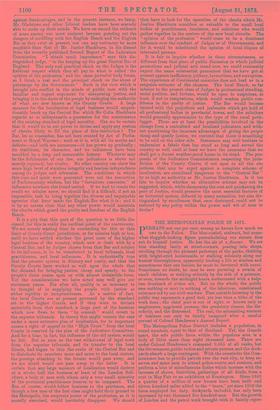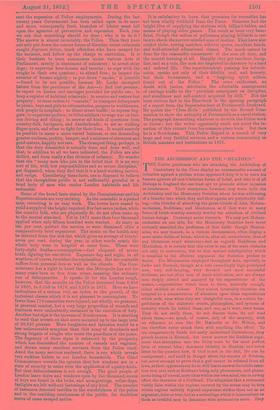THE METROPOLITAN POLICE IN 1871.
PERHAPS not one per cent, among us knows how much we owe to the Police. The blue-coated, stalwart, but some- what sluggish-looking figure perambulating our streets does not do himself justice. He has the air of a jlaneur. We see him standing lazily at street-corners, peering into shops, strolling through the pleasant pathways of the parks, chatting with bright-eyed housemaids, or stalking solemnly along our busiest thoroughfares, apparently leading a life so aimless and monotonous that one fancies he must be devoured with ennui. Sometimes, no doubt, he may be seen pursuing a swarm of small children, or walking sedately by the side of a prisoner, or even, towards the midnight hours, embarrassed with a help- less drunkard of either sex._ But on the whole, the public sees nothing or next to nothing of the laborious, constrained existence led by our civil warders. That amiable loitering in the public way represents a good deal, yet less than a tithe of the work done ; the chief part is out of sight, or known only to magistrates, aggrieved persons, the predatory classes, the dis- orderly, and the distressed. The real, the astonishing amount of business can only be faintly imagined after a careful perusal of Colonel Henderson's Annual Report.
The Metropolitan Police District includes a population, in round numbers, equal to that of Scotland. Yet, the Guards apart, the sole public force within the populous area is a body of little more than eight thousand men. There are under Colonel Henderson's command 9,655 of all ranks, but the Government, public bodies and private persons, and the dock- yards absorb a large contingent. With the remainder the Com- missioner has to provide patrols over the vast city, to keep re- serves and spare men to attend police-courts and sessions, and perform a host of miscellaneous duties which increase with the increase of shows, festivities, gatherings of all kinds, from a rout in May Fair to an exhibition at Kensington. Since 1849 a quarter of a million of new houses have been built and eleven hundred miles added to the "beats," yet since 1862 the force employed for duty, dockyards included, has only been increased by two thousand five hundred men. But the growth of London and the patrol work brought with it faintly repre. sent the expansion of Police employments. During the last twenty years Government has been called upon to do more and more, consequently fresh branches of labour must fall upon the agencies of prevention and repression. Each year we ask that something should be done ; who is to do it The answer is almost invariably, the Police. Thus they have not only put down the coarser forms of disorder, arrest criminals caught flagrante delicto, track offenders who have escaped for the moment, and follow up the charge to conviction. It is their business to issue summonses under various Acts of Parliament, mostly in abatement of nuisances ; to arrest stray dogs ; to supervise beer-houses and taverns ; to cope with the roughs in their own quarters ; to attend fires ; to inspect the exterior of houses nightly ; to put down "smoke," if possible —found to be not possible, because Mr. Locke exempted bakers from the provisions of the Act—to find lost persons ; to report on horses and carriages provided for public use ; to keep a register of habitual criminals ; to receive and restore lost property; to issue orders to " casuals ;" to transport delinquents to prison, boys and girls to reformatories, paupers to workhouses, sick people to hospitals ; to direct street traffic ; to repress beg- gars; to supervise pedlars; to billet soldiers; to wage war on furi- ous driving and riding ; to answer all kinds of questions from country-folk, foreigners, and dunderheads ; to act as walking finger-posts, and often to fight for their lives. It would scarcely be possible to name a more varied business, or one demanding greater coolness, probity, temper, and a mixture of sternness and good-nature, happily not rare. The strangest thing, perhaps, is that the duty demanded is actually done, and done well, and that, in addition to all we have indicated, the Police are also drilled, and form really a fine division of infantry. No wonder that the "many men who join in the belief that it is an easy sort of life, with few responsibilities and no severe discipline," get disgusted, when they find that it is a hard-working service, and resign. Considering these facts, one is disposed to believe that the thoughtless public is not sufficiently grateful to a tried body of men who render London habitable and life endurable.
Some of the broad facts stated by the Commissioner and his Superintendents are very striking. As the constable is a picked man, recruiting is no easy work. The towns have ceased to yield a supply of the height required, five feet seven inches, while the country folk, who are physically fit, do not often come up to the mental standard. Yet in 1871 more than four thousand applied when only fifteen hundred were wanted. As many as ten per cent, quitted the service, or were dismissed after a comparatively brief experience. The strain on the health may be inferred from the sick list, which gives an average of ninety- seven per cent. during the year, in other words, nearly the whole body were in hospital at some time. There were forty-eight deaths—consumption—fact eloquent of severe trials, figuring for one-third. Exposure day and night, in all weathers, of course, furnishes the explanation. But the constable suffers from personal foes as well as the climate. The Com- missioner has a right to boast that the Metropolis has not for many years been so free from crime, meaning the ordinary run of delinquencies. It speaks ill for the London rough, however, that the assaults on the Police increased from 2,858 in 1869, to 3,058 in 1870, and 3,325 in 1871. Here we have indications of a serious evil, an index to the growth of the turbulent classes which it is not pleasant to contemplate. No fewer than 776 constables were injured, not wholly, we presume, in personal combat, but a very large proportion of wounds and fractures were undoubtedly sustained in the execution of duty. Another bad sign is the increase of drunkenness. It is startling to read that arrests on that score mounted up to the large total of 28,240 persons. More burglaries and larcenies would be a less unfavourable symptom than this army of drunkards and strong brigade of roughs who resist the guardians of the peace. The flagrancy of these signs is enhanced by the prosperity which has diminished the number of casuals and vagrants, and drawn many excellent servants from the Police itself. Amid the many services rendered, there is one which reveals very reckless habits in our London households. The Chief Commissioner records the opinion that few windows are in a state of security to resist even the application of a putty-knife. But that defencelessness is not enough. The good people of London leave doors and windows open by the thousand, scores of keys are found in the locks, and area-gratings, cellar-flaps, fanlights are left without fastenings of any kind. The number of instances detected testifies to the watchfulness of the police and to the confiding carelessness of the public, for doubtless Scores of cases escaped notice. It is satisfactory to learn that provision for recreation has not been wholly withheld from the Force. Someone had the bright idea of supplying the stations with billiard-tables, and means of playing other games. The result as been very bene- ficial, though the notion of policemen playing billiards is cer- tain to shock the narrow-minded sons of routine. Theyhave also cricket clubs, rowing matches, athletic sports, excellent bands, and well-attended educational classes. Too much cannot be done for the reasonable amusement of the men off duty, and. the mental training of all. Happily they get excellent discip- line, and as a rule, the men are improved in character by a hard and ordered life. One superintendent, praising his subordi- nates, speaks not only of their fidelity, zeal, and honesty, but their forbearance, and a "forgiving spirit seldom found out of the Police." The same enthusiast, no doubt with justice, attributes the admirable management of carriage traffic to the "precision consequent on discipline, and steadiness and self-control acquired by drill." Not the least curious fact in the Blue-book is the opening paragrapb. of a report from the Superintendent of Portsmouth Dockyard. He quotes the "Close Rolls" published by the Record Com- mission to show the antiquity of Portsmouth as a naval station. The paragraph has nothing whatever to do with the Police work or duties ; but the writer apparently could not resist the in- sertion of this extract from his common-place book. But then he is a Scotchman. This Police Report is a record of very large and very faithful services, and a curious commentary on British manners and institutions in 1871.



































 Previous page
Previous page